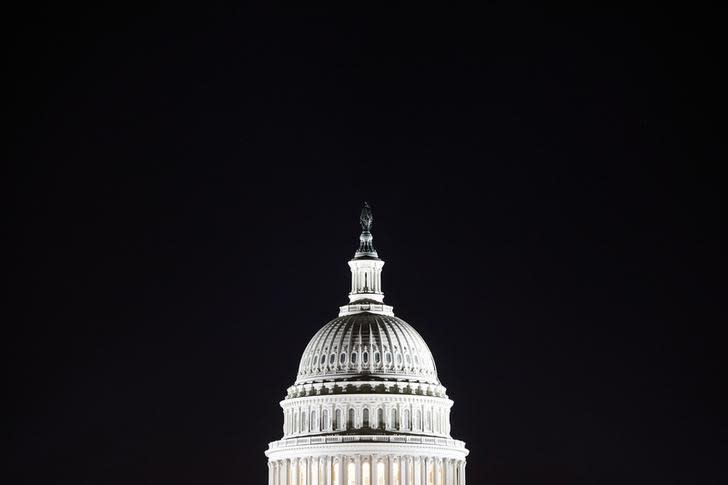Republicans push ahead with U.S. tax bill as Democrats sharpen attacks

The
U.S. Capitol dome is pictured in the pre-dawn darkness in this general
view taken in Washington, October 18, 2013. U.S. lawmakers launched an
effort to resolve budget differences in a less confrontational fashion
on Thursday as Washington picked up the pieces from a political crisis
and 16-day government shutdown that has slowed the economy and
undermined the country's international standing. REUTERS/Jonathan Ernst
(UNITED STATES - Tags: POLITICS BUSINESS)
By Amanda Becker
WASHINGTON
(Reuters) - Republican lawmakers on Monday began revising their
proposed overhaul of the U.S. tax code, as Democrats pointed to the loss
of popular deductions as proof the legislation was an assault on the
middle class.
A
draft bill unveiled last week by Republicans in the House of
Representatives, if enacted, would be the biggest restructuring of the
tax system since the 1980s and the first major legislative victory of
the Trump presidency.
One
of the first changes agreed to on Monday, related to carried interest,
would go towards fulfilling one of President Donald Trump's campaign
promises.
Republican
Representative Kevin Brady, chairman of the House tax-writing panel,
offered to make smaller portions of Wall Street financiers' income
eligible for a lower capital gains tax rate.
It
was one of many revisions that are expected as the House Ways and Means
Committee amends the tax bill. Brady pledged to lawmakers that they
would have a chance to propose their own changes. "Let me assure you
this is the beginning of the tax reform process," he told the committee.
Although
Republicans generally support the bill's broader themes, including a
sharp cut in the corporate income tax, there are rumblings of dissent
over other elements, including repeal of the deduction for state and
local income tax (SALT) payments.
New
York, California and other high-tax states would be hard hit by the
removal of that deduction, a fact seized upon by Democrats to bolster
their argument that Trump's plan is a gift to the wealthiest Americans
and the corporate sector.
"There
are a lot of people expecting a tax cut who will be big losers under
this bill," Representative Bill Pascrell of New Jersey, a Democrat on
the House Ways and Means Committee, said as the tax-writing panel
convened to consider the bill.
An
analysis of how taxpayers would be impacted by the bill from the
nonpartisan Tax Policy Center issued on Monday was later withdrawn due
to an error. TPC said that its analysis contained an error related to a
proposed child tax credit and that it would release a revised version as
soon as possible.
The White House argues that tax cuts are needed to boost economic growth and create jobs.
The
linchpin of the plan is the reduction of the corporate tax rate to 20
percent from 35 percent and establishment of a 25 percent tax rate for
"pass through" businesses, which currently pay income tax rates as high
as 39.6 percent.
With
Democrats united in opposition to the plan, Republican defections from a
few traditionally Democratic-leaning states could be enough to torpedo
it in the House.
Brady
has already agreed to retain the deduction for property tax payments up
to a cap of $10,000 as part of a SALT compromise and has said he would
be open to raising it.
Brady's
carried interest provision would lengthen to more than three years from
one the amount of time Wall Street financiers must hold assets in order
to be eligible for a lower tax rate.
Carried
interest is a share of an investment fund's profits – typically about
20 percent beyond the return guaranteed to investors – that goes to the
general partners of private equity, venture capital and hedge funds.
Under
current law, high-income fund partners pay the long-term capital gains
rate of 20 percent on their carried interest income, instead of the 39.6
percent individual tax rate that applies to the ordinary wage income of
high earners.
MARKET RALLY ON EXPECTATIONS
Securing
congressional passage of the tax plan is critically important to Trump,
who has yet to get major legislation through Congress since taking
office in January, including a healthcare overhaul he promised as a
candidate last year.
Investors
are adding to the pressure. The expectation of deep tax cuts has helped
fuel a stock market rally during Trump's time as president, with the
broad S&P 500 index up about 14 percent.
The
Senate, where Republicans have a 52-48 majority, is developing its own
version of the tax legislation, which would have to eventually be
reconciled with the House version before it is sent to Trump for
signing.
Several
Republican senators have said they would have a problem voting for any
tax bill that significantly increased the deficit. The House bill is
projected to add $1.5 trillion over 10 years to the $20 trillion
national debt.
Reuters in Yahoo news
No comments:
Post a Comment